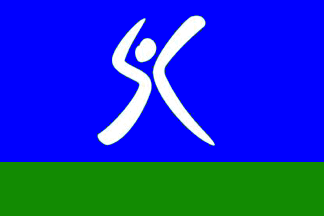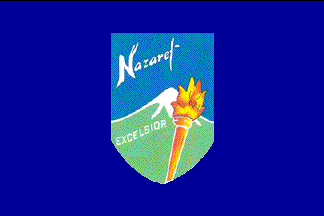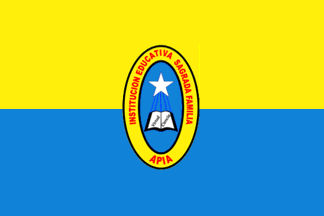 klaus-michael schneider
klaus-michael schneider
Keywords: education |
Links: FOTW homepage | search | disclaimer and copyright | write us | mirrors

Last modified: 2021-08-26 by  klaus-michael schneider
klaus-michael schneider
Keywords: education |
Links: FOTW homepage |
search |
disclaimer and copyright |
write us |
mirrors
See also:
Other Institutions:
 image by Ivan Sache, 1 January 2021
image by Ivan Sache, 1 January 2021
Gimnasio Sabio Caldas was established in 2000 in Bogotá.
The school's
name ("Wise Caldas") refers to the naturalist and politician Francisco José de
Caldas (1768-1816), who supported the independence and was executed by the
Spanish troops.
The flag of Gimnasio Sabio Caldas is horizontally divided
blue-green (4:1) with the white emblem of the school in the center.
Blue
represents the sky, and the youth's ideas and illusions.
Green represents the
natural environment, enthusiasm, calm and peace.
The emblem represents a
lively, running student.
https://sabiocaldas.edu.co/el-sabio/nuestros-simbolos/bandera
School
website
Ivan Sache, 1 January 2021
 image by Ivan Sache, 1 January 2021
image by Ivan Sache, 1 January 2021
The flag is also used without the emblem.
Photo
https://i0.wp.com/sabiocaldas.edu.co/wp-content/uploads/2016/05/IMG_0535.jpg?w=1500&;ssl=1
Ivan Sache, 1 January 2021
 image by Ivan Sache, 05 January 2009
image by Ivan Sache, 05 January 2009
"Colegio del Sacrado Corazón" (of the Sacred Heart)
was founded in Baranquilla in 1956. The different sections of the
institute were progressively recognized by the Ministry of
National Education. All the relevant Decrees were superseded on
25 November 1978 by Decree No. 17518 recognizing all the sections
of the institute
The flag of the institute, according to photos
and the description
available on the website of the institute, is horizontally
divided red-white-red.
Red represents the love burning in the sacred heart of Jesus.
White represents the purity of the Christian doctrine.
Ivan Sache, 5 January 2009
 image by Ivan Sache, 31 October 2014
image by Ivan Sache, 31 October 2014
Escuela Normal Sady Tobón Calle was established in El Cerrito (Valle
Department) by the parish priest, Sady Tobón Calle. Classes started on 8
February 1960 in a house owned by Cristóbal Duarte. On 20 April 1960, the parish
priests of San Miguel, Miranda, Carcasí, and Capitanejo asked the Bishop to
close the school, arguing that Father Tobón had initiated it only for his own
enrichment and that education given there was impious and against the Christian
religion, aiming at increasing the number of Liberals in the area. The Bishop
visited the school during the next two days and deemed the accusations against
Tobón null and voided.
Jairo Pimiento Traslaviña, appointed director of the institute in 1992, was
murdered in a terrorist attempt on 2 December 1993. The institute was renamed
Escuela Normal Superior Sady Tobón Calle by Resolution No. 9,026 of 12 October
2001; Father Sady Tobón Calle died on 17 January 2004 in Medellín.
The flag of the institute, adopted in 1962, is horizontally divided white-green
with the institute's emblem, placed on a white disk, in the middle. White is a
symbol of joy and aspiration to peace. Green is a symbol of hope.
The emblem of the institute is an heart-shaped shield, with the same colours as
the flag, but arranged transversally. The upper part is white, a symbol of
transparency, peace, and verity, and charged with the Greek letter "Α" and "Ω",
which represent the presence of God, the beginning and end of everything, in all
our acts. The lower part is green, charged with a human figure in a dynamic
attitude, wrapped inside the Colombian tricolor and bearing an Olympic torch,
and with an open book, as a symbol of science and pedagogic knowledge.
The shield has a black bordure charged with the name of the institute and the
name of the municipality (at the top) in golden yellow letters. Beneath the
shield is a scroll or inscribed with the motto "DIOS CIENCIA CARIDAD" (God
Science Charity) inscribed in black letters. The original design of the shield
was modified in 2001, following the initiative of Jaime Hugo Pulido, director of
the school.
Source:
http://ensadytobon.wordpress.com/about/ - Institute's website
Ivan Sache, 31 October 2014
 image by Ivan Sache, 03 November 2014
image by Ivan Sache, 03 November 2014
Centro Educativo Sagrada Familia de Nazaret (CESFN) was established in Bogotá
by the Missionary Daughters of the Holy Family of Nazareth, a congregation
founded in 1874 by St. Josep Manyanet Vives (1833-1901; canonised on 16 May 2004
by Pope John Paul II)
The flag of the institute is dark blue with the institute's emblem in the
middle. Dark blue is the colour of the student's uniform in all educational
institutes established by the Missionary Daughters of Nazareth. The emblem of
the institute features:
- a snow-topped mountain representing Mount Teide, the highest mountain in
Spain, meaning that you always have to go up to the top to reach excellence;
- a torch, as a symbol of triumph and accomplishment:
- the name of Nazaret written in the heavens.
Source:
http://www.colegionazaret.edu.co/2014/index.php/nuestro-colegio/emblemas -
Institute's website
Ivan Sache, 03 November 2014
 image by Ivan Sache, 3 January 2021
image by Ivan Sache, 3 January 2021
Institución Educativa Sagrada Familia is located in Apía (Risaralda).
The flag of IE Sagrada Famimlia is horizontally divided yellow-blue with the
school's emblem in the center.
Photo
https://www.facebook.com/Institución-Educativa-Sagrada-Familia
Yellow
represents intellectual, moral, social and religious resources
Blue
represents limpidity and brightness, virtue, purity and symphony, rectitude and
constancy, peace, calm and serenity.
The star is a symbol of knowledge
and intellectual resources.
The open book is a symbol of mind, life, proper
personality; each page of the book or of the student's life shall be sealed with
the motto "Virtue and Science". The ray emitted y the star illuminate the book,
permanently open.
https://www.sagradafamiliaapia.edu.co/trans_contratos.html
School
website
Ivan Sache, 3 January 2021
 image by Ivan Sache, 25 July 2014
image by Ivan Sache, 25 July 2014
Colegia Sagrada Sabiduria (Sacred Knowledge) is located in Soledad (Atlántico
Department).
The flag of the institute is white with the institute's
emblem in the middle.
The emblem of the institute is a shield vertically
divided blue-red and bordered in red. In the middle is placed a white, open book
surmounted by a yellow rising sun and flanked by two white hands. The shield is
surrounded by two green wreaths.
http://colegiosagradasabiduria.edu.co/?page_id=20 - Institute's website
Ivan Sache,
25 July 2014
 image by Ivan Sache, 30 October 2014
image by Ivan Sache, 30 October 2014
Escuela Sagrado Corazón was established on 4 February 1920 in Chita (Boyacà
Department) by Emilio Larquere. He was succeeded in 1923 by José María Potier,
who changed the name of the school to Liceo Sagrado Corazón para Señoritas. The
school was renamed Escuela Normal Sagrado Corazón in 1956. Closed in 1960, the
institute was re-opened in 1962, as Colegio Sagrado Corazón, renamed Escuela
Normal Nacional Mixta Sagrado Corazón in 1980.
The flag of the institute is horizontally divided white-green. White is a symbol
of peace. Green is a symbol of aspiration to a better future.
Source:
http://escuelanormalsuperiorchita.jimdo.com/simbolos/bandera/ - Institute's
website
Ivan Sache, 30 October 2014
 image by Ivan Sache, 9 January 2004
image by Ivan Sache, 9 January 2004
The flag of the College is white with two red triangles in the
upper left and lower right corners. Red represents the Sacred
Heart of Jesus.
Source: <www.voluntad.com.co>,
located by Dov Gutterman.
Ivan Sache, 9 January 2004
 image by Ivan Sache, 8 November 2010
image by Ivan Sache, 8 November 2010
Colegio Sagrado Corazón de Jesús de La Salle, located in San José de Cúcuta,
Department of Norte de Santander, was founded on 3 June 1903 by Father Pablo
Alegria. The institute is managed by the Brothers of the Christian Schools,
founded by St. Jean-Baptiste de La Salle.
The flag of Colegio Sagrado Corazón de Jesús de La Salle, as shown graphically
on the institute's website, is horizontally divided yellow-olive green. Yellow
represents light and wisdom. Olive green represents hope. The same colors are
used on the institute's coat of arms.
Ivan Sache, 8 November 2010
 image by Ivan Sache,
6 July 2014
image by Ivan Sache,
6 July 2014
Colegio Sagrados Corazons was established in 1950 in Florencia (Caqueta
Department) by the Congregation of the Daughters of the Holy Hearts of Jesus and
Mary, founded in 1868 by the Italian nun Eugenia Ravasco (1845-1900; beatified
on 27 April 2003 by Pope John Paul II).
The flag of the institute is
horizontally divided celestial blue-pink. Blue and pink are the colours of the
cloak and of the tunica of Mary Help of Christians.
http://www.sagradoscorazones.edu.co/site/simbolos/gestion-directiva/simbolos.html
- Institute's website
Ivan Sache, 6 July 2014
 image by Ivan Sache, 22 September 2014
image by Ivan Sache, 22 September 2014
Colegio San Pascual Baylon, located in the parish of América, part of the
town of Medellín (Antioquia Department) was closed in 1944 by its founder and
director, Alfonsos Lopera Lopera. In December 1944, several "important and
influent" inhabitants convinced the recently appointed (6 October 1944) parish
priest, José Betancur Campuzano, to push the establishment of a parish school.
His Grace Joaquín García Benítez (1883-1958), Archbishop of Medellín (1942-1957)
allowed in 1945 the priest to establish Liceo Salazar y Herrera. The new school
was named for His Grace Tiberio de Jesús Salazar y Herrera (1871-1942),
Archbishop of Medellín (1937-1942), known as the "Education's Archbishop",
founder of Escuela Normal Antioqueña para Señoritas and of the Universidad
Pontificia Bolivariana.
Source:
http://www.salazaryherrera.edu.co/ - Institute's website
The flag of the institute, adopted in 1964, is horizontally divided
blue-white-red. Blue is a symbol of value, audacity, and intrepidness. White is
a symbol of purity. Red is a symbol of nobleness, majesty, and serenity.
Source:
http://www.salazaryherrera.edu.co/es/Liceo/Institucional/Simbolos -
Institute's website
Ivan Sache, 22 September 2014
 image by Ivan Sache, 26 July 2018
image by Ivan Sache, 26 July 2018
Colegio Salesiano San Juan Bosco is located in Dosquebradas (Risaralda
Department).
The flag of Colegio Salesiano San Juan Bosco is horizontally
divided green-white.
Green is a symbol of joy and optimism.
White is a
symbol of excellence.
http://www.salesianosjb.edu.co/web2/index.php/instiutcional/menu-options/manual-de-convivencia
Manual de Convivencia
Ivan Sache, 26 July 2018